These Unique Blogs Are Written By Professors

Why the interest in blogs by professors and lecturers? I think academics often have a unique perspective. Think of how their community of peers, researchers and students are different than your own. Think of the journals and books they read, the research they conduct, the conferences they attend, the lectures they present, and the discoveries their students make. This gives them access to ideas and concepts that can promote distinctive thinking.
Fortunately for us, blogging is an excellent channel professors can leverage without going through the rigors of formal publishing. So if you’d like to see what professors of instructional design/technology, education, media, human factors, design and literature are writing about, here are some you’re bound to find interesting. The list is in alphabetical order by blog title. The original article was written over five years ago and has been updated with new discoveries and a few old standbys.
Warning: Several of these blogs need visual makeovers, so don’t flinch. Perhaps that just proves how academic they really are.
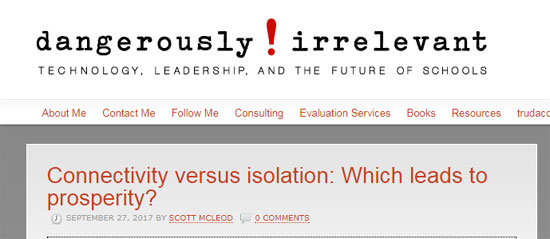
The striking title of this blog reveals that Scott McLeod, an Associate Professor of Educational Leadership at the University of Colorado Denver, is on a mission to kick start schools into the 21st century. His blog covers technology and leadership topics as they relate to the future of schools. The blog title comes from the fact that although the world is both digital and global, most K-12 schools are not.
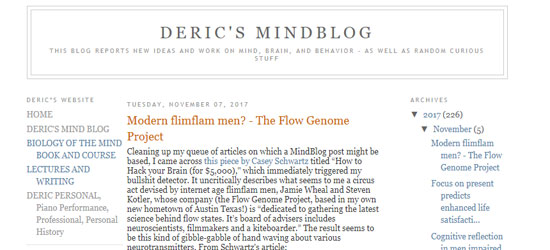
This blog created by Deric Bownds, Ph.D., began in 2006 to “report on new ideas and work on mind, brain, and behavior, as well as random curious stuff.” Bownds is an Emeritus Professor of Molecular Biology and Zoology at the University of Wisconsin. You will find interesting research on cognitive psychology and other brain-related topics. I check here often for updates and he does a good job of frequent publishing.
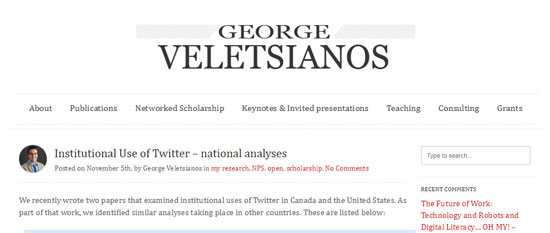
George Veletsianos holds a Canada Research Chair in Innovative Learning and Technology and is a professor at Royal Roads University. His blog focuses on emerging technologies as well as the design and development of innovative distance learning experiences. You may also be interested in Veletsianos book, Emerging Technologies in Distance Education.
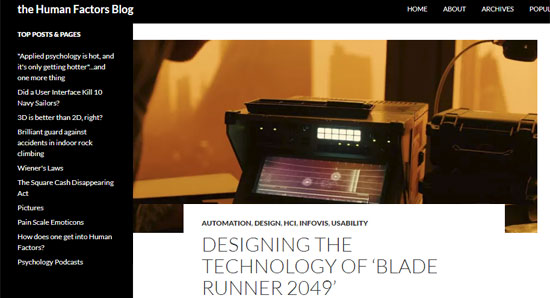
If you’re fascinated by the study of human factors, then I think you’ll want to spend time on this site. It is the blog of Richard Pak, Associate Professor in the Department of Psychology at Clemson University and Anne Collins McLaughlin, Associate Professor at North Carolina State University in the Department of Psychology. Their stated goal is to engender “lively conversation concerning the field of human factors.” And browsing through their articles, you can see that the topics will do just that. They relate human factors to current events, technology in media and academic research.

As the title implies, this blog is all about helping people use metacognitve strategies for learning and for finding personal success in education. Although the emphasis is on the process of metacognition in a higher ed academic setting, it also offers guidance on metacognitive instruction. There are some helpful resources to understand metacognition too. The site was created by three academics with varying positions: Lauren Scharff, John Draeger and Aaron S. Richmond.
If you’re not familiar with metacognition as a concept, see my foundation article on Metacognition and Learning: Strategies for Instructional Design.
David Wiley has been promoting the benefits of sharing open educational resources for years. This interest goes beyond the academic—he creates ways to facilitate sharing through his projects, such as Flat World, which offers remixable textbooks by expert authors (free online). His blog examines open educational resources in a way you are not likely to find elsewhere. If you are involved in education, you’ll probably appreciate what Wiley is hoping to achieve.
Wiley is now an adjunct faculty in Brigham Young University’s graduate program in Instructional Psychology and Technology, where he leads the Open Education Group (and was previously a tenured Associate Professor).
Karl Kapp is the assistant director and faculty member at Bloomsburg University’s Institute for Interactive Technologies. He is the author of several books, including The Gamification of Learning and Instruction, Learning in 3D. and co-author of Play to Learn (see my review). Kapp is a passionate proponent of learning through games, particularly as a means for educating the next generation. Although his blog covers many learning-related topics, the main focus is on how to incorporate virtual worlds and games into learning experiences. You’ll discover a wonderful collection of articles on these topics as well as industry news.
You can listen to or download the transcript of my interview with Karl: Learning Games, What Works and What Doesn’t.

This is an aggregator of faculty blogs from the Kellogg School of Management at Northwestern. The entries vary widely, including workplace advice, marketing and branding, entrepreneurship and social dynamics. If you’d like to get a taste of academic blogging all in one place, this is a good place to come. I wish all schools within colleges and universities would aggregate into a one-stop shop. It’s convenient and varied.
True to the title of the blog, Ray Schroeder, Ray Schroeder, Professor Emeritus and Associate Vice Chancellor for Online Learning at the University of Illinois Springfield, weaves together a savvy blend of news and updates related to online learning. This blog has been published daily since 2001 and consists of a short summary and link to articles broadly related to online learning. Schroeder says the blog, “provides a scholarly chronicle of the development of the technology, pedagogy and practice of online learning at all levels of education in the U.S. and elsewhere.”
This blog is written by Pat Thomson, Professor of Education at The University of Nottingham. Her research primarily focuses on how schools might change to be more engaging and meaningful for more children and young people. Her research covers the arts, creativity and other kinds of experiential approaches in school and community settings, including galleries and museums. Her writing covers all aspects of research and writing. For example, blog topics cover understanding theories, what a framework is, and how to revise your writing with the audience in mind.
Teaching & Learning in Higher Ed. has a mission. It supports teachers and reformers in higher education by encouraging serious engagement with relevant scholarship. In every article, you can feel the heart behind the methods and examples he recommends for teaching and learning at all levels.
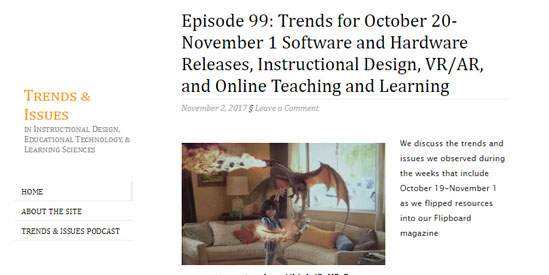
It’s a blog. It’s a podcast. It’s a magazine! This website, with a title fit for an academic paper, follows what’s going on in and around our field on a weekly basis. It’s good stuff. You can get your information in several mediums too. Their Flipboard magazine is a great example of curation as it highlights articles of interest.
All of this wonderfulness is powered by two professors: Abbie Brown, Ph.D., Professor at East Carolina University in the Instructional Technology Program and Tim Green, Ph.D., professor of educational technology and teacher educator at California State University, Fullerton. Listen to my interview with them on the future of instructional technology.

Viral-Notebook covers online learning design and associated technologies. It’s written by Michael Grant, who is program coordinator for the Educational Technology program at the University of South Carolina. Previously, he spent twelve years in the Instructional Design & Technology program at the University of Memphis. You’ll find topics that would interest either educational technology or instructional design geeks, such as posts on mobile learning and instructional design models. There’s also a good set of links to his publications and presentations.
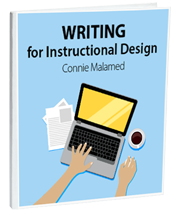
Get the latest articles, resources and freebies once a month plus my free eBook, Writing for Instructional Design.















![Toni Kroos là ai? [ sự thật về tiểu sử đầy đủ Toni Kroos ]](https://evbn.org/wp-content/uploads/New-Project-6635-1671934592.jpg)


